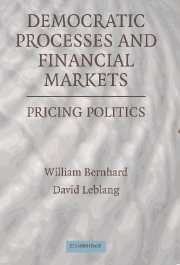Book contents
- Frontmatter
- Contents
- Acknowledgments
- 1 Introduction
- 2 Democratic Processes and Political Risk: Evidence from Foreign Exchange Markets
- 3 When Markets Party: Stocks, Bonds, and Cabinet Formations
- 4 The Cross-National Financial Consequences of Political Predictability
- 5 Cabinet Dissolutions and Interest Rate Behavior
- 6 Bargaining and Bonds: The Process of Coalition Formation and the Market for Government Debt in Austria and New Zealand
- 7 Time, Shares, and Florida: The 2000 Presidential Election and Stock Market Volatility
- 8 Polls and Pounds: Exchange Rate Behavior and Public Opinion in Britain
- 9 Conclusion: Political Predictability and Financial Market Behavior
- References
- Index
8 - Polls and Pounds: Exchange Rate Behavior and Public Opinion in Britain
Published online by Cambridge University Press: 02 December 2009
- Frontmatter
- Contents
- Acknowledgments
- 1 Introduction
- 2 Democratic Processes and Political Risk: Evidence from Foreign Exchange Markets
- 3 When Markets Party: Stocks, Bonds, and Cabinet Formations
- 4 The Cross-National Financial Consequences of Political Predictability
- 5 Cabinet Dissolutions and Interest Rate Behavior
- 6 Bargaining and Bonds: The Process of Coalition Formation and the Market for Government Debt in Austria and New Zealand
- 7 Time, Shares, and Florida: The 2000 Presidential Election and Stock Market Volatility
- 8 Polls and Pounds: Exchange Rate Behavior and Public Opinion in Britain
- 9 Conclusion: Political Predictability and Financial Market Behavior
- References
- Index
Summary
To this point, we have investigated how political events shape asset market behavior. We have shown that less predictable events often lead to shifts in asset market behavior or increases in market volatility. But what are the political consequences of this asset market volatility? In this chapter, we examine how asset market volatility can affect government popularity.
One issue in measuring the impact of asset market behavior on political outcomes is that neither “markets” or “politics” is exogenous. If we take asset markets as exogenous to political factors, we discount the possibility that politics affects market behavior. On the other hand, if we assume that political events are exogenous, we ignore the possibility that market activity can precipitate a cabinet dissolution or affect an electoral outcome. An accurate assessment of how markets and domestic politics affect each other, therefore, requires an analysis of how both evolve together.
We examine the relationship between government popularity and exchange rate movements in Britain between 1987 and 2001. We argue that unexpected drops in the government's public support will lead to currency depreciations and increased exchange rate volatility. In turn, unanticipated depreciations hurt the government's public support.
We estimate separate models of exchange rate volatility and government voting intention iteratively and recursively. At each iteration, we use estimates from each model to generate measures of exchange rate and public opinion shocks.
- Type
- Chapter
- Information
- Democratic Processes and Financial MarketsPricing Politics, pp. 198 - 224Publisher: Cambridge University PressPrint publication year: 2006



